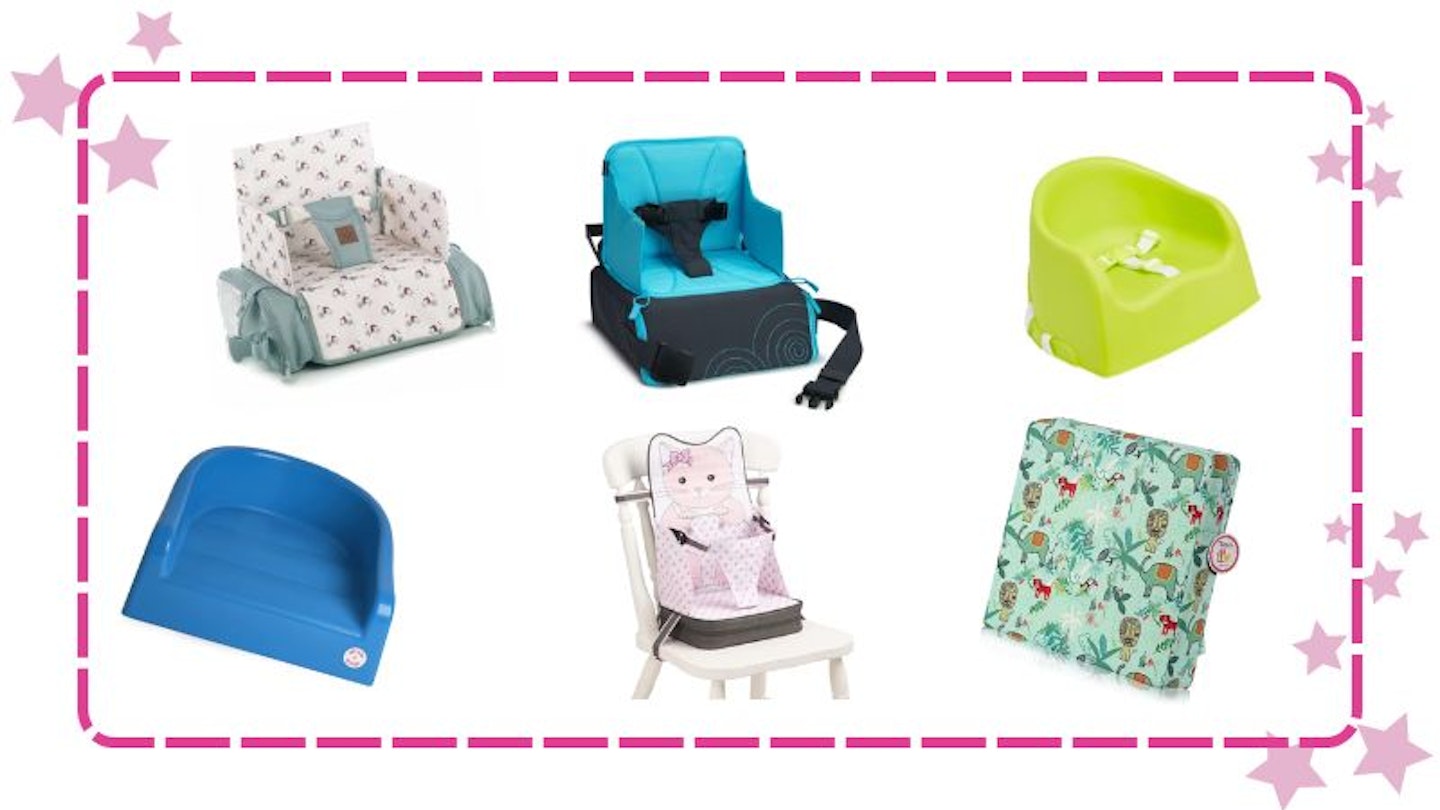When your child no longer needs a highchair for babies but still needs help reaching the dining table, a booster seat is ideal. Meal times with a young child can get a little stressful, so having your little one level at the table so you can communicate properly with them is always a great start.
Booster seats are also a portable option for dinner with a child, so whether you're in your dining room or at a restaurant, the best booster seats for the table can be used with most dining chairs. They help your child feel more grown-up, and take up less space than a highchair too.
For all meal times, as well as the best weaning products, a booster seat is a must-have for your table – they may not make dinner with a toddler completely stress-free, but they'll definitely make things a little smoother. For breakfast, lunch, and dinner, a booster seat can make all the difference.
The best booster seats at a glance:
• Best booster seat for versatility: Apramo Flippa Dining Booster - Buy now on Amazon UK
• Best for kid appeal: Baby Polar Gear Portable Booster Seat with Matching Place Mat - Buy now on Amazon UK
• Best 2-in-1 booster seat: Jane Avant 2in1 Highchair Seat-Bag - Buy now on Amazon UK
• Best for feeling grown up: Prince Lionheart Soft Booster Seat - Buy now on Amazon UK
If your little one ready for some independence while sitting at the table, take a look at our carefully curated list of the best booster seats to help your toddler or child take part in family meal times.
The best booster seats
Best booster seat for versatility
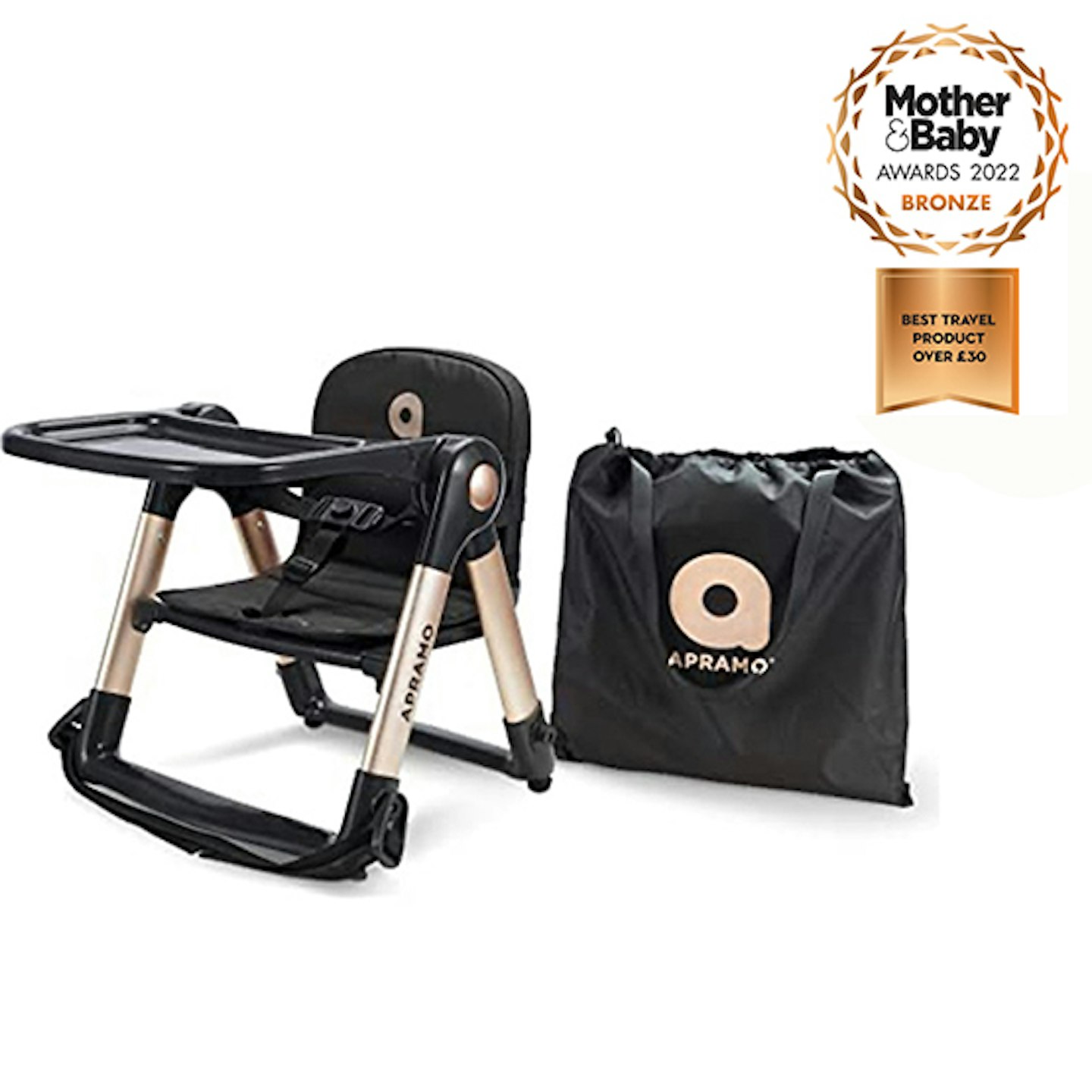 Amazon
AmazonThis booster seat won Bronze in the 2022 Mother&Baby Awards for Best Travel Product Over £30.
The Apramo Flippa Dining Booster is the perfect travel companion for when you're out and about with your little one or for use at home. One reviewer said, "bought this seat for my Great Grandson who is nine months old. He is very happy to sit and play as well as have his food." We love that it can be used for mealtimes and for play too, plus it can be safely attached to almost any chair, whether you're in a restaurant or visiting friends.
The seat has a supportive back, a fully adjustable harness, and a large tray that is ideal for dinner and playtime and can easily be removed so baby can come closer to the table and a reviewer commented, "this seat is very easy to open up and close, and a carry bag is an added bonus. It is lightweight and easy to store. Excellent, so happy with it."
One of our mum testers, Savannah, said, "it's very sturdy which means it's less likely to cause any unwanted accidents. It's easily wipeable as the black material doesn't show mess as often as a lighter seat would. I think it's helped in my everyday as I no longer have to use a big hefty highchair." We love how versatile this seat is for at home and on the go, with another mum tester, Constance, saying, "it easily fits in a suitcase."
However, one mum tester, Ellie, found the tray buttons tricky to use noting, "On occasion, it was tricky using both hands to push in the tray buttons, especially if you are alone and don't have anyone to hold your baby while you do it." Overall, though this is a useful highchair which can be used for play or during meals, is easy to clean and packs up small so it's easy to travel with.
Read our full Apramo Flippa Dining Booster review
Pros
- Compact when folded, fits in a suitcase
- Attaches to most chairs
- Easy to clean
- Includes a travel bag
Cons
- Buttons to remove the tray are tricky with one hand
| Dimensions: | 38 x 40.01 x 30 cm |
| Material: | Aluminium, Rubber |
| Suitable For: | 6 months to approx 3 years |
- Ergonomic seat
- Removable tray
- Three colours available
Best 2-in-1 booster seat
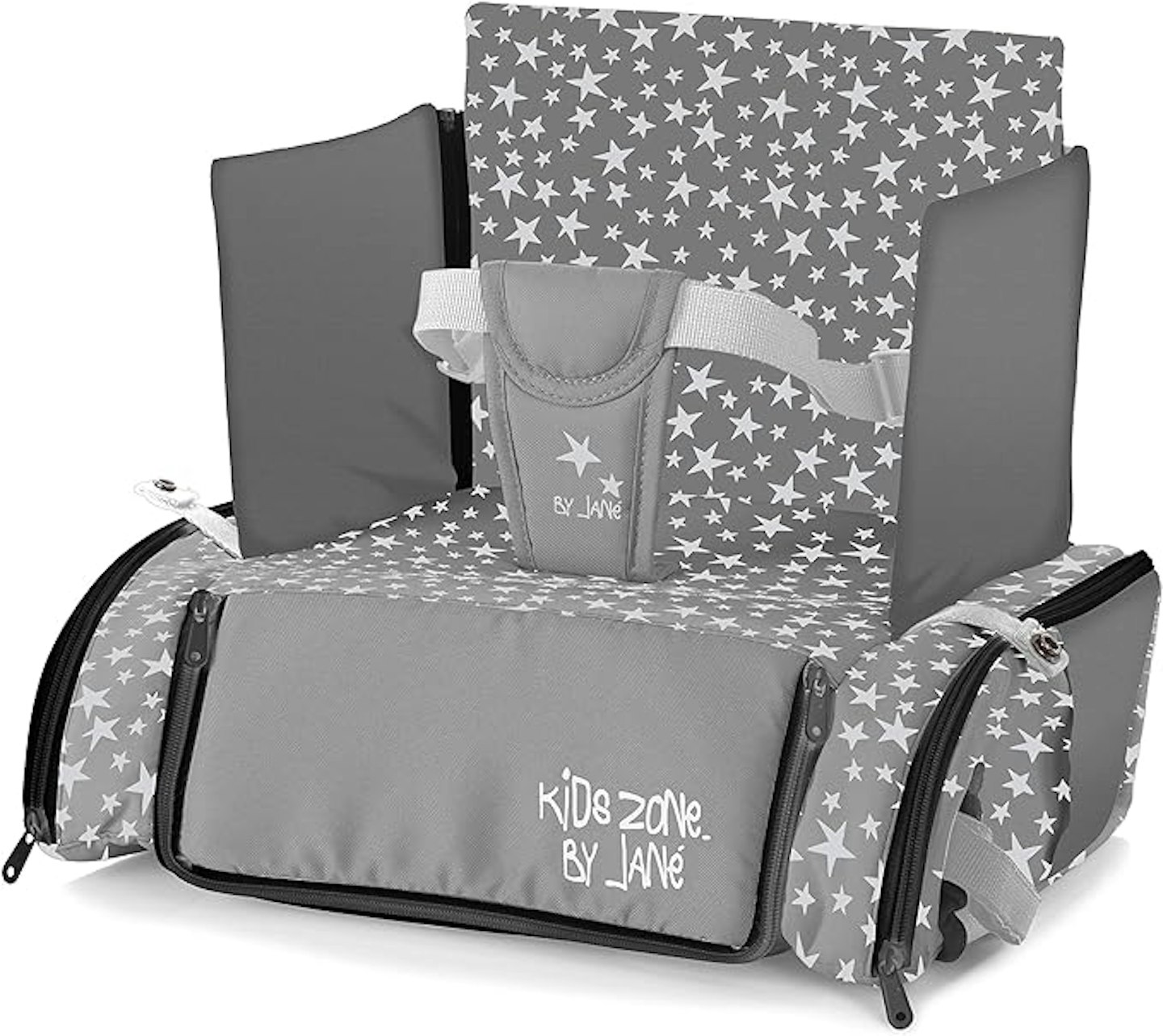 Amazon
AmazonA versatile booster seat that not only acts as a highchair but also as a baby bag too, with one reviewer commenting, "this bag easily converts to a cute and stylish seat booster with a 3-point harness." However, we love that the Jane Avant 2in1 Highchair Seat-Bag has a rigid interior structure, so when being used as a seat, the inside doesn't get squashed, making it durable. It also has external compartments for storage and can fasten to your pram, which make it extremely convenient.
Despite being a bag and chair, two items which can get quite messy, the material is easy to clean. One reviewer said, "it is made of a really soft and good quality material and can be wiped clean as well as washed." Obviously the 2-in-1 function is very practical but more than that reviewers liked the amount of storage the bag provides, commenting, "when the bag is folded, there are 3 compartments inside the bag, which can contain baby wipes, some baby food, a bottle, and a beaker. The bag itself is quite light, ideal for travelling and feeding on the go. Great for places like restaurants or when visiting friends and family."
Suitable from 6 months to 3 years, this bag will last you as long as you need a highchair. However, do beware that while it is great for travelling, it might not be a great permanent option at home and you might require something a little more sturdy, especially if little one is using the seat for playtimes too. That said, one reviewer felt it was extremely useful and said, "one of the best purchases I've ever made for my daughter. It does not weigh anything, it can be assembled and disassembled in a moment, it is very easy to clean, it fits any chair and the pockets are sooo spacious! You can bring all of the day's food inside!"
Pros
- Convenient bag and highchair seat combined
- Durable but lightweight for travel
- Includes storage pockets
Cons
- Not ideal for continuous use at home
| Dimensions: | 30 x 47 x 36cm (33.5 x 31 x 15cm folded) |
| Material: | Padded upholstery |
| Suitable For: | 6 months to 3 years |
- Shoulder strap/Carry handle
- Approved lateral reinforcement
- Stain-resistant
Best for kid appeal
 Amazon
AmazonThis versatile booster seat weighs just 700g yet offers both a height boost and a five-point harness to help keep little diners in place at the table. One reviewer said, "my granddaughter is 10 months and it’s difficult to bring everything you need when they come to stay. This was an ideal solution to a highchair. It folds up and is easy to carry so very useful for days out, absolutely brilliant. Easy to clean and fits securely to a dining chair." They also added, "due to the style of my table, it was difficult to find one that would fit under and still leave room for my granddaughter's legs; this one fits perfectly and feels very secure. Would highly recommend it."
We love that the cushion is inflatable, so it can be packed up and chucked in a drawer or under your pram, and the harness comes higher up than a lap belt, making this a sensible choice for younger toddlers, with one reviewer commenting, "really light, practical, easy to assemble and pack away and easy to clean."
To make this even more convenient the booster seat becomes a compact shoulder bag, with an extra pocket containing a portable changing mat. Reviewers liked this function, with one saying, "the booster seat is a really good design and is of good quality. It fits nicely into a high chair and is very useful for ordinary chairs. Great also for travel in that you can zip it up and carry it over your shoulder."
However, reviewers did note that the back does not provide support and one reviewer said it "slouches at the back." That said, it is a good size and a reviewer added that "this seemed a little small when I put it on my chair and I was a little concerned my grandson wouldn’t fit but I was wrong. He is 2 and it is just right for him."
Pros
- Inflatable cushion can is easy to travel with
- Includes a five-point harness
- Folds up into a compact shoulder bag
Cons
- It doesn't provide much back support
| Dimensions: | 30 x 26 x 44 cm |
| Material: | Foam |
| Suitable For: | 1 - 3 years |
- Adjustable straps
- Shoulder strap for carrying
- 3-point harness
Best for feeling grown up
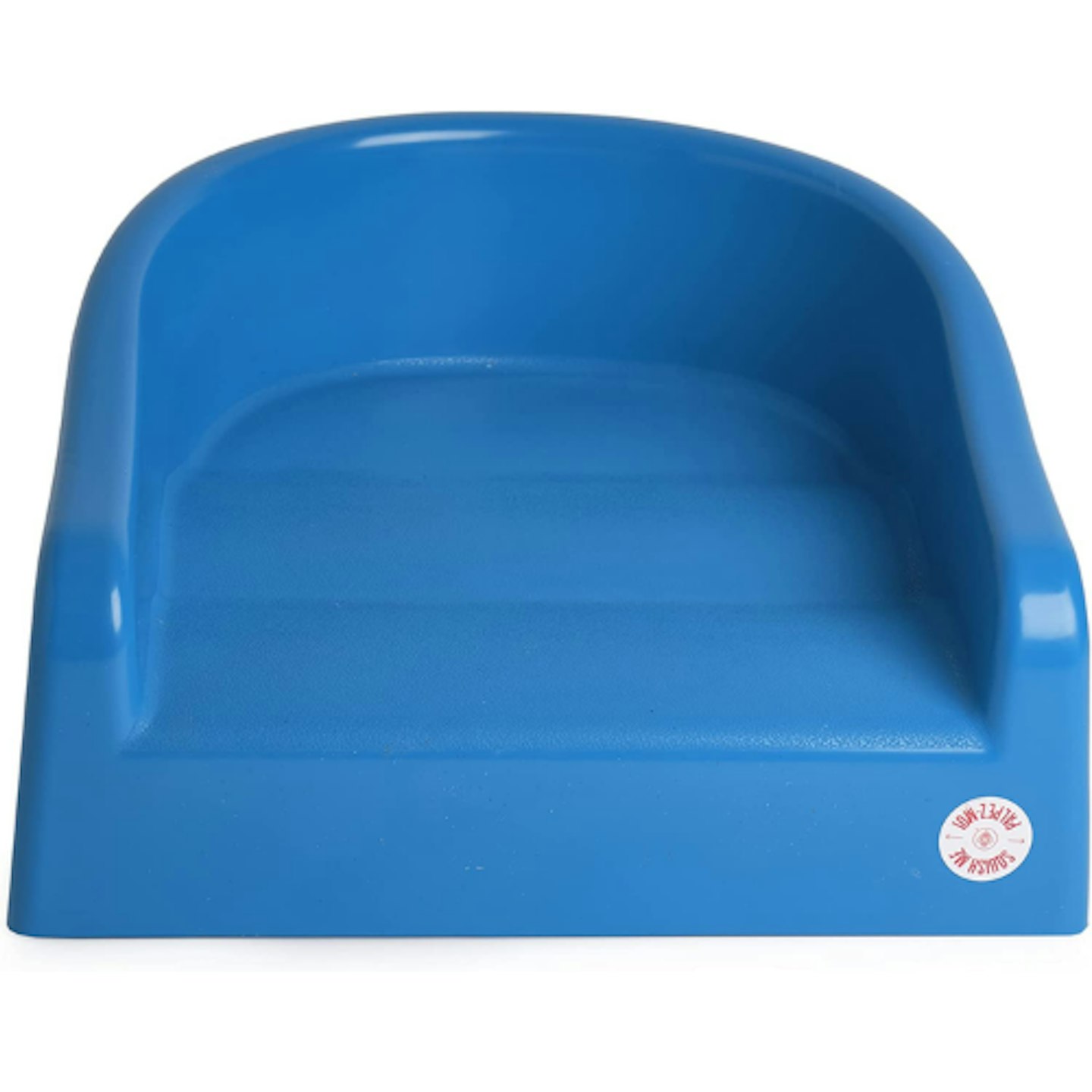 Amazon
AmazonThe simple Prince Lionheart Soft Booster Seat is perfect for older toddlers who want to feed themselves but can’t reach the table, or for when they still need a booster seat to reach the table but not a highchair. One reviewer said, "my 2y9m old daughter was growing out of her high chair - it was getting a mission to lift her in and out of it. This seat is perfect for us - sturdy yet not totally hard to sit on, we just place it on a dining chair, no faffing with straps etc which I think are no longer needed at this age." Plus, we love that it’s made from soft waterproof material and has absolutely no awkward corners, so it’s extremely easy to clean and comfortable, too.
This booster seat is available in three colours and is suitable from 18 months and it is great for introducing a little independence at mealtimes with a reviewer commenting, "she climbs in herself - we just ensure she doesn't push the seat off too far, but it tends to stay put quite well (the material will grip a little on leather, faux leather or plastic). When we push the chair forward, she's pretty well placed to not spill too much food on her clothes or lap. We love it!"
However, some reviewers commented that the chair doesn't stay in place on all surfaces and one said, "the plastic feet simply slide with the child's movement," which means there is a risk little ones could fall off the chair. However, overall parents were impressed and one noted, "love this booster chair! I have many grand children ages baby on up. With other booster chairs, I have to put towels underneath to protect my chairs from being scratched; then I’m dealing with straps etc. This booster seat is soft on my chairs, sticks in place, easy to clean and was exactly what I was looking for!"
Pros
- Great for introducing independence
- Soft, comfortable foam
- Doesn't scratch chairs
Cons
- Some reviewers didn't think it stayed in place
| Dimensions: | 34 x 33 x 18 cm |
| Material: | Foam |
| Suitable For: | Babies & taddlers |
- Slip-resistant
- Waterproof
- Comes in two colours
Best for security
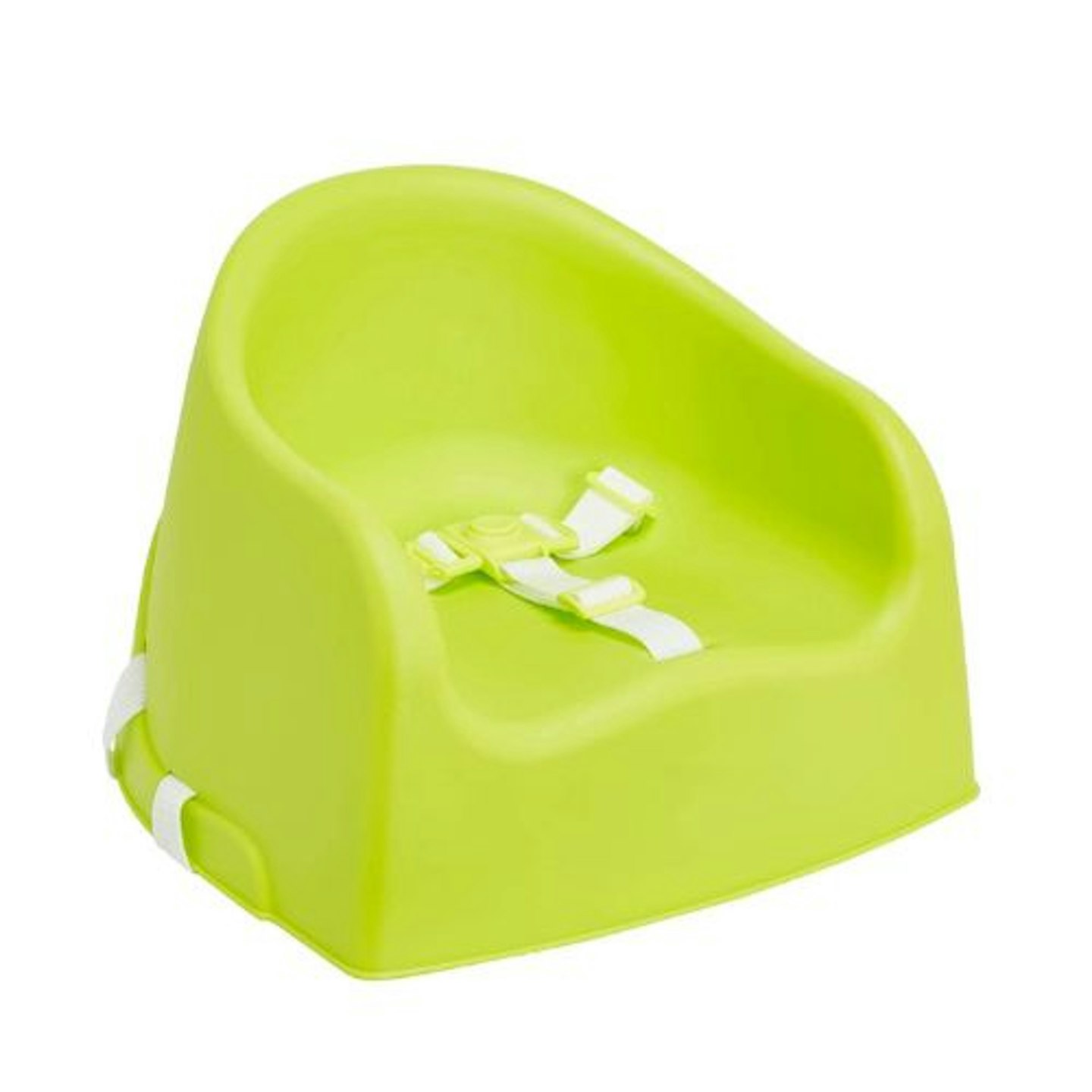 Amazon
AmazonThe brilliant just 4 baby Portable Feeding Dining Booster Seat will keep your baby secure and the three-point safety harness will keep them safe and can be adjusted as your child grows. One reviewer said, "not too bulky, child loves sitting at the table now. Easy enough to take off and move around for cleaning." And we all know that babies can be messy at dinnertime, so it's great that this booster seat has an easy-to-clean surface.
While this is a great chair for including little ones at the table for family mealtimes, one reviewer did find it tricky to attach it to a chair, commenting, "nice and sturdy seat. Easy for my little 1 year old daughter to eat a meal at the table with family. Only issue for us is that the straps that fasten under the seat are not long enough so our seat only fastens round the back of our chair."
For a booster seat, it is practical and durable, allowing children enough height to be comfortable at the table, plus it is easy to clean which is important, however, do check it will fit your chairs, and ensure you like the colour because it is only available in lime green.
Pros
- Sturdy but lightweight, easy to move
- 3-point safety harness with adjustable straps
- Easy to clean
Cons
- Straps not long enough to fit all chairs
| Dimensions: | 40.6 x 39.4 x 25.9 cm |
| Material: | Plastic |
| Suitable For: | Baby |
- 3-point safety harness
- Two fixing straps
- Easy to clean
Best for style
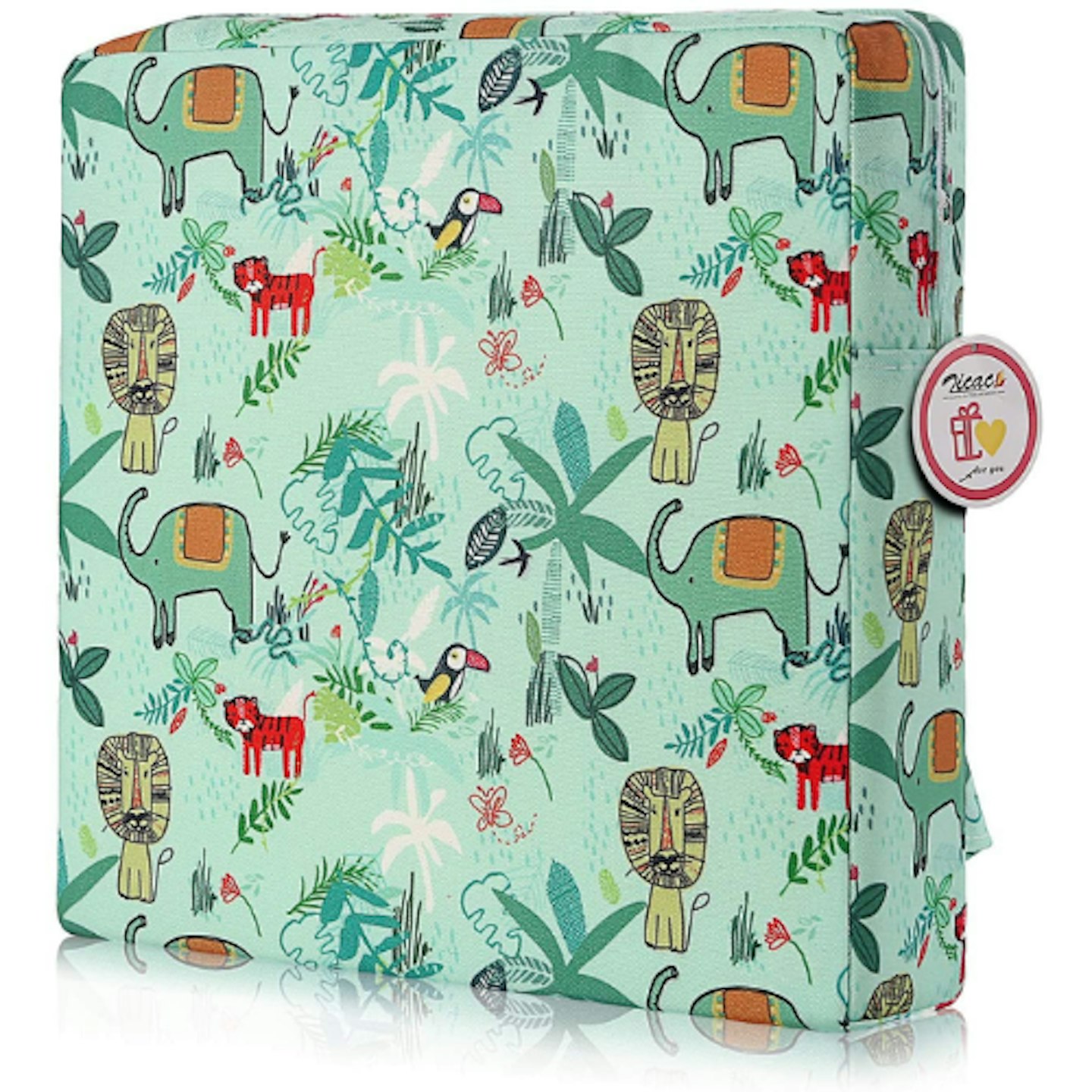 Amazon
AmazonAvailable in several sweet designs, this comfy booster seat will add a height of 3.1" to your tot, but do bear in mind that it is designed for children two years or older, because there are no straps to secure your little one. However, there are straps to secure the booster pad to the chair meaning it won't slip or slide. One reviewer found this very useful, saying, "I have a two-year-old who climbs out of high chairs even when strapped in - often shooting across the table at dinner times! We decided to bite the bullet and get rid of the high chair - this cushion is just what we needed. It's firm and fits the chair perfectly - he can safely get up and down as well."
We love that this cushion looks cute, with some fun designs, but also that the cover is removable and can be machine washed. One reviewer said, "both the inner cushion and exterior material are easy to clean and it doesn't take long to reassemble. Son was very happy with the dinosaur print and is now sat at a better height when eating."
It is really handy that this can be used for toddlers and older children with one reviewer commenting, "brought for 5 year old that insists on siting on our dining chairs to eat but is still a little too small to do it comfortably. This cushion is comfortable and firm enough to raise her to a suitable height. Our chairs are quite large so the cushion looks too small but it works just fine."
Pros
- Removable cover which can be machine washed
- Choice of fun designs
- Suitable for toddlers and older children
Cons
- There are no straps to secure younger children
| Dimensions: | 32 x 32 x 7.87 cm |
| Material: | Canvas, Sponge |
| Suitable For: | Children above 2 years old |
- 12 patterns/colour to choose from
- Two extra strong adjustable straps
- High density sponge
Best travel option
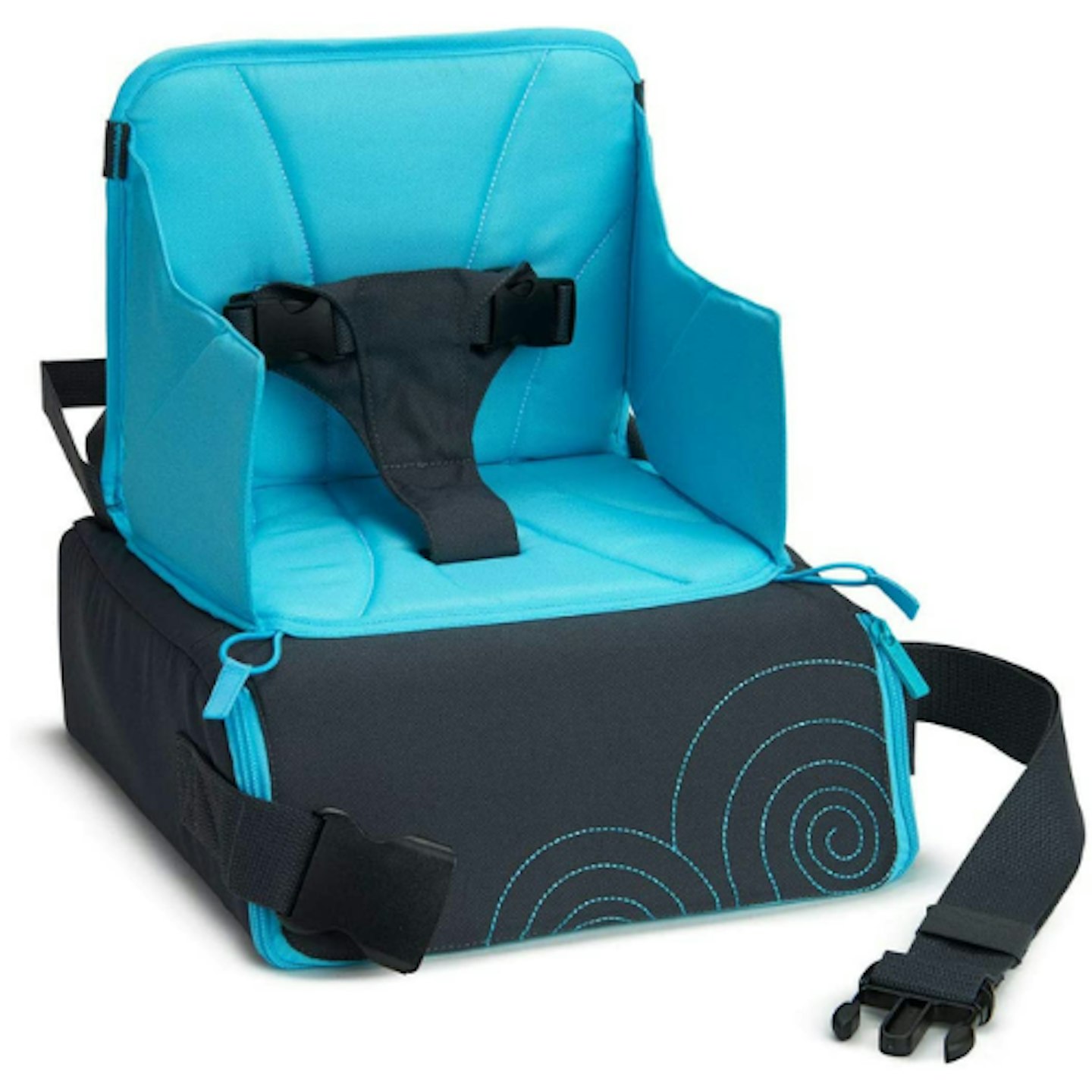 Amazon
AmazonThis clever travel bag easily transforms into a booster seat for your youngster, offering a convenient and protective storage section for essentials such as bottles, cups, nappies, and more. One reviewer said, "purchased this for our upcoming trip away as our IKEA highchair takes up so much room in the car. Our 18-month-old is very happy to sit in this and seems secure." We think that it's a great option if you're on the go a lot because it's ultra-portable with a carry strap included and folds away neatly, so it's also ideal if you don't have much space at home.
Another reviewer commented that it is great for meals out, saying, "really, really happy with this purchase. Very handy, easy to transport, set up and take down and very secure. The young man who uses it seems to be perfectly comfortable in it too, which is a bonus. Wipes clean with a wet wipe or cloth. Would highly recommend this product. Much better than using a dodgy high chair when going out to eat."
However, one parent reviewer found it is susceptible to stains, commenting, "the reason that I don't recommend it for daily use (which I have been using it for since buying a month ago) is because the chair has a fabric covering which cannot be removed, so unless you have the world's cleanest and most well behaved toddler, there is going to be food dropped on it, and mucky fingers grabbing at the sides on a daily basis. Obviously, you can have a go at wiping off with a cloth, but the fabric is still stained/marked to some degree, and will continue to stain if it gets mucky at every meal." That said, it is a practical choice, with adjustable straps, and another reviewer added, "this is the second one I've bought as I have a 4 year old, a 2 year old and a baby on the way. The straps can be adjusted according to the size of the child," ensuring longevity.
Pros
- Folds neatly and has a carry strap
- Easy to use when out, both setting up and taking down
- Adjustable straps on the harness
Cons
- Stains if not wiped properly
| Dimensions: | 15.49 x 29.31 x 29.79 cm |
| Material: | Polyester |
| Suitable For: | 12-36 months |
- Adjustable 3-point harness
- Xtra-Grip traction pads
- Stable internal frame
Best for quality
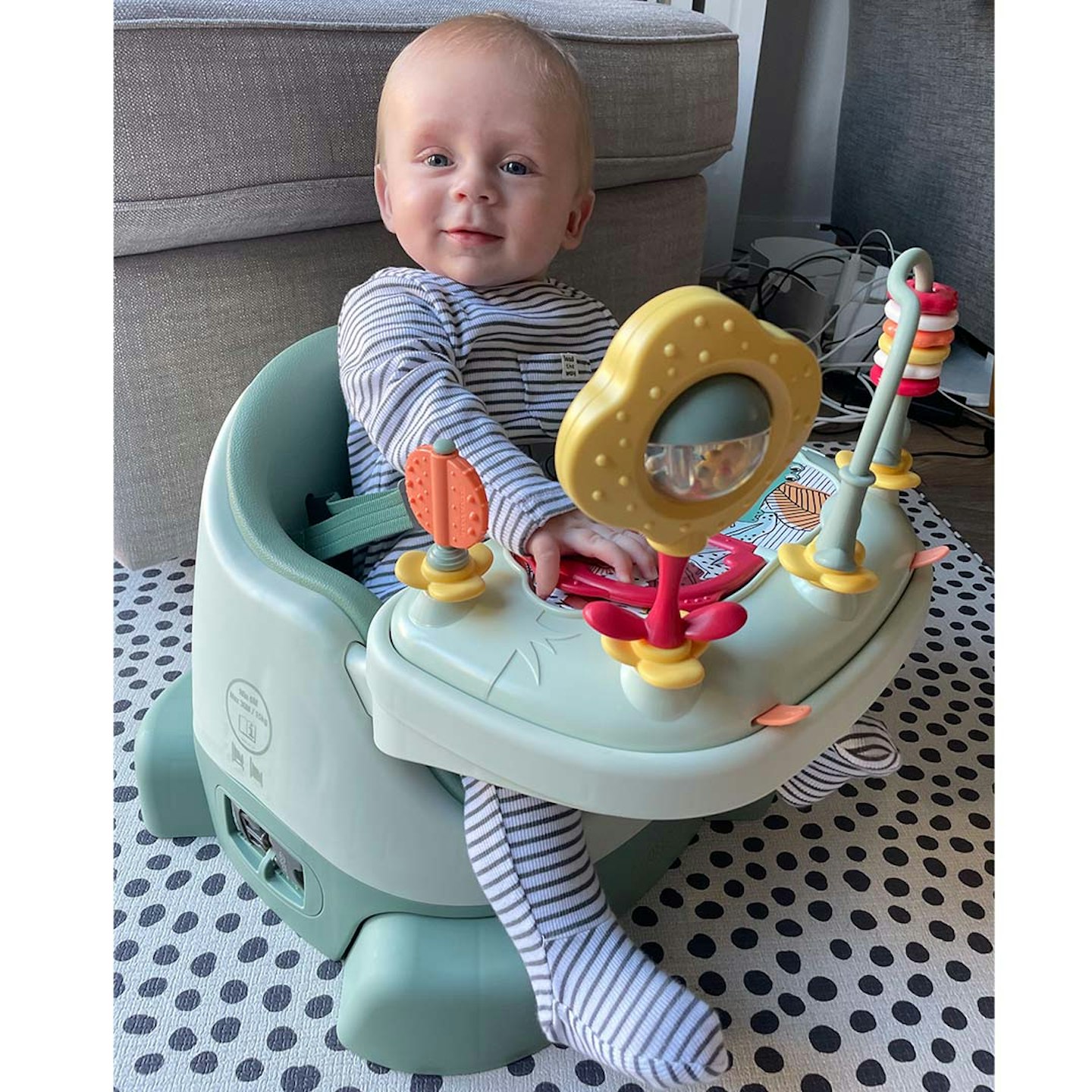 Emily Gilbert
Emily Gilbertwww.mamasandpapas.com
Perfect for eating out or at the dining table at home, the Mamas + Papas Bug Floor & Booster Seat comes with a carry handle for easy hauling and a removable tray, which is great for extending the usage of your booster seat once your little one is ready to eat directly from the table. "With three different modes (floor, chair and booster), I love that it has such great longevity as this is an important factor for me when it comes to baby products," says Features & Reviews Editor Emily Gilbert who has been using the Bug with her son Theodore.
The Bug comes with a colourful interactive tray to keep your baby engaged, something Emily found a huge help when entertaining her baby and helping him learn to sit. "For a while he just looked at the toys on the tray but eventually, he learnt how to use them and this was great at buying me a little time to enjoy a hot drink."
With adjustable non-slip feet, a padded seat and a harness, your child will sit comfortably and safely as they play and eat, plus we love the design which will look great at home too.
Suitable for children three months and over it can be used first as a floor seat when baby is three months and then from the start of your weaning journey, through to when your little one no longer needs a booster seat at the table. "The padded insert can be removed which makes it a doddle to keep clean when it comes to weaning or general baby drool and sick," adds Emily.
Do be aware that this is quite a bulky chair which is worth bearing in in mind if you are limited for space. Overall though, this is an easy to clean, portable and durable booster seat which will last your youngster from three months to three years.
Pros
- Removable tray for when little one can reach the table
- Adjustable non-slip feet
- Lining cushion can be removed as baby gets bigger
Cons
- Not the most compact
| Dimensions: | 31 x 33.8 x 36.5cm |
| Material: | Polypropylene, Polyurethane, Acrylonitrile Butadiene Styrene |
| Suitable For: | 3 months - 3 years |
- Removable tray
- Four adjustable non-slip feet
- Padded removable seat insert
- Three modes
Best for easy cleaning
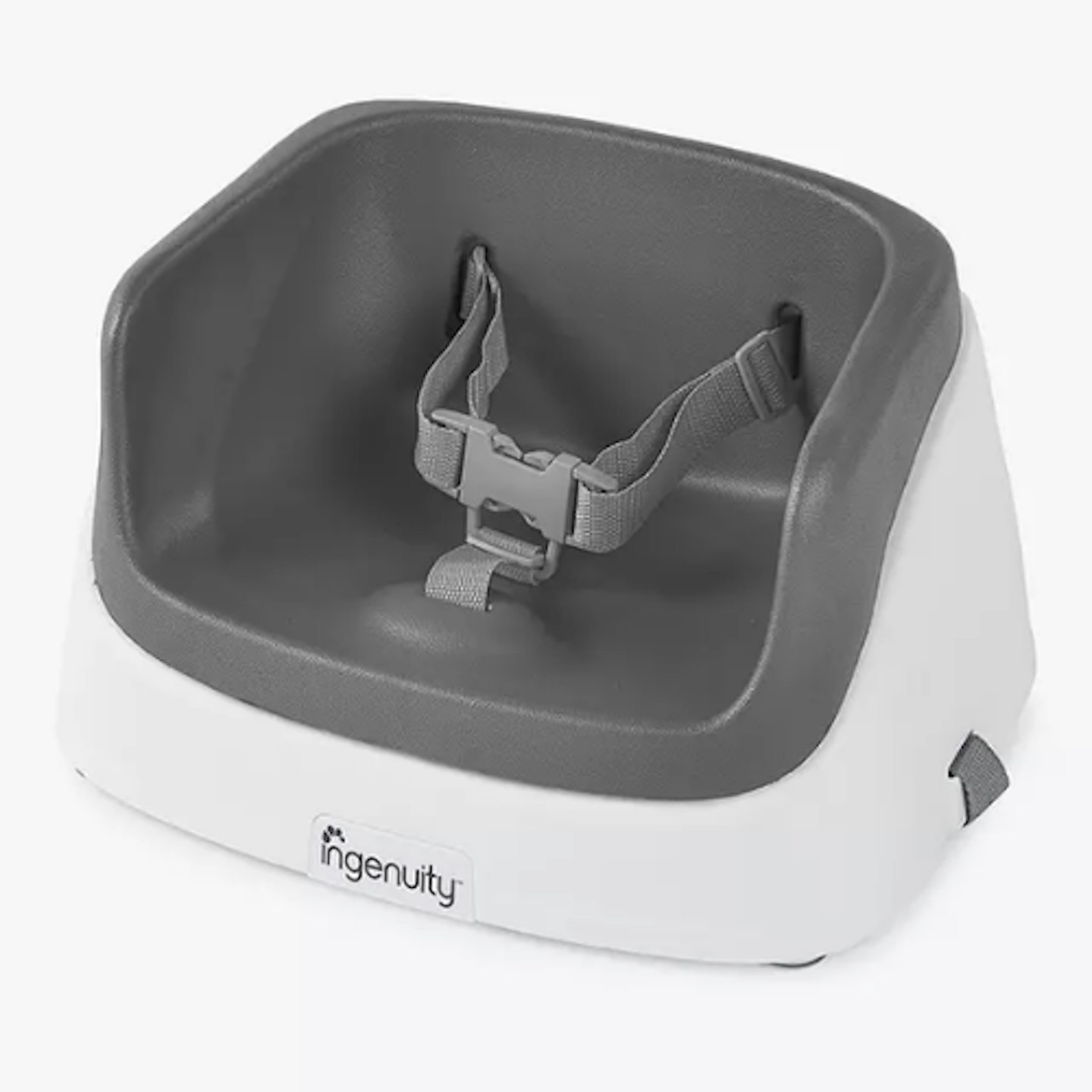 Amazon
AmazonIf you've got a mucky-pup for a baby at dinner times, this booster seat will answer your prayers! Designed to stand up to the toughest mealtime messes, the whole seat can be easily wiped clean, with one reviewer noting, it's "very easy to clean as the grey inner is removable." That means you can spend less time cleaning and more time enjoying your little one's company.
Suitable from 16 months, this is definitely more appropriate for older babies and toddlers and it helps create a sense of independence and being part of family mealtimes as one reviewer said, "my son enjoys sitting in it and feels more involved at meal times." However, it also keeps your little one safe because it still has a three-point harness. Another reviewer added, "I bought this because my 19 month old was starting to become reluctant to sit in her high chair and climb on the dining room chairs. She now sits nicely at the table, less mess, less fuss and she eats more than she did. From day one of getting this there was a remarkable improvement."
It is important to note that some reviewers did think it was quite big, especially the base, with one saying, "the base is almost bigger than the seat of the chair so something to consider when ordering" and another adding, "the only downside is we can't push the chair under the table when not in use as the booster catches on the underside of the table."
Pros
- Removable foam insert to make cleaning easier
- Strong, sturdy straps
- Straps can be machine washed
Cons
- Quite large and bulky
| Dimensions: | 39.37 x 30.48 x 20.96 cm |
| Material: | Foam |
| Suitable For: | Babies and toddlers up to up to 33 lbs |
- Easy wipe clean
- 3-point safety harness
- Two colours available
Best for compact storage
 Amazon
AmazonThe Chicco Pocket Snack Booster Seat is not only versatile, with height adjustment for the seat to ensure all babies can reach the table and a removable tray, but it's also great for storage. If you're limited on space or want to fold away your booster seat for another child to use when they're old enough, this removable booster can be folded down when not in use and moved with the carry straps. One reviewer said, "great product, very sturdy, folds up to a nice size for storage or travel, like the seat attachment as it means my 10 month old can sit at the table with us and not to the side in a normal high chair"
It is ideal for babies from 6 months at the start of their weaning journey right up to 36 months when it's likely they might not need a booster seat at the table anymore. Reviewers did find the tray difficult to remove and attach, with one saying, "the tray is extremely difficult to remove. It's very stiff and cumbersome (it's best to loosen one side at a time and push from behind rather than try to pull from the front)," and another commenting, "the tray is very difficult to put on and take off."
As a booster for using while on holiday, or when visiting friends and family, this is a great option with reviewers agreeing it is lightweight but sturdy, and one reviewer commented, "if you like eating out, going for picnics, eating at family/friends house then this is a must for your LO. It folds up flat, fits under a buggy, is easy to set up, and fits on most chairs."
Pros
- Three adjustable heights
- Compact when folded so great for travelling
- Suitable from 6 months to 36 months
Cons
- It is difficult to remove the tray and put it back on
| Dimensions: | Unspecified (Weight: 2.2kg) |
| Material: | Plastic |
| Suitable For: | 6 months and over |
- Four level height adjustment
- 2 year guarantee
- Carry straps
Best for multiple uses
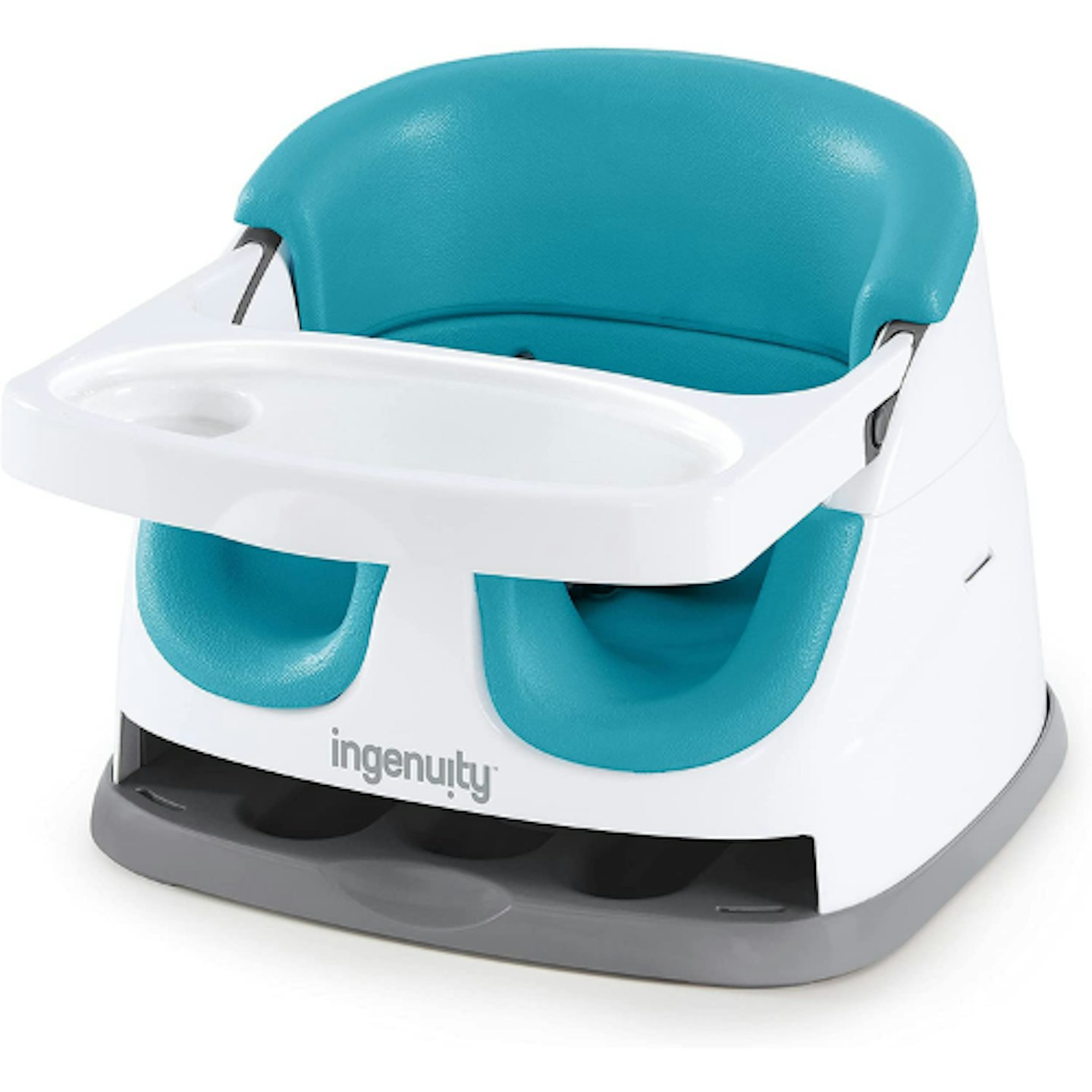 Amazon
AmazonThis portable booster seat works just as well sitting with you at the table for feeding, or as a supportive floor seat during playtime! One reviewer said, "the booster chair I recently purchased has been an absolute game-changer in our household. It ticks all the boxes for convenience, comfort, and versatility, making it an indispensable accessory for baby care, especially during the crucial phase of baby-led weaning."
We love the removable tray which stores neatly under the booster seat when not in use, plus the foam insert can be removed when your baby outgrows it for extended use, with one reviewer saying, "good quality and design, and a handy tray that can easily be removed." While it is useful for mealtimes, it is also great for playtime on the floor and one reviewer commented that it's "excellent to help a baby who can almost sit unaided."
While it is suitable up to 22kg, some reviewers didn't think the straps were strong enough for this weight, one said, "it’s also very flimsy." However, another reviewer commented, "it's safe, practical and easy to clean. It will last ages for me as I'll use the seat on the floor with tray for snacks and then at the table strapped to a chair for when baby is older. So happy with it." Plus we like that the tray is dishwasher safe, which is extremely convenient for busy parents.
Pros
- Converts from baby seat on the floor to booster seat for the table
- Dishwasher safe
- Tray can be stored in seat to make it easy to travel with
Cons
- Straps could be stronger, especially for older babies and toddlers
| Dimensions: | 43.82 x 29.85 x 38.74 cm |
| Material: | Foam |
| Suitable For: | Toddlers up to 50 lbs |
- Multi-functional design
- Removable BPA-free tray
- Adjustable straps
How to choose a booster seat
You can choose a high chair booster seat that has a removable tray (that will fit their toddler plates and cutlery) and cushions, while others are essentially just straps. What works for you will depend on what age and stage your child is at and how portable you need the booster seat to be.
Some can be used for babies from six months. Just make sure it has a supportive backrest and harness. Most come with a three-point harness that is highly adjustable so it can grow with your child, making it a useful product for a fast-growing tot.
Avoid anything with nooks and crannies so you can clean the seat easily, and make sure your booster seat of choice has a non-slip bottom, keeping toddlers safer and more secure.
Are booster seats safe to use?
Booster seats are safe to use, especially when used correctly. It is important to follow the safety instructions for the product and also these simple steps:
• Always use the safety straps provided to keep your child safely seated. Check they are in good working order and firmly attached to the chair. Also, remember that the tray alone is not sufficient for keeping them in place.
• Stay with your child during mealtimes. An unsupervised child is more likely to try to escape, kick back from the table or choke on food.
• Make sure the chair attached to the booster seat is strong, weighty and stable without wheels.
• Keep the area around the booster seat clear. As your child will have closer access to what is on the table, make sure hot foods or sharp utensils are kept out of reach.
• Before moving to a booster seat, make sure your baby is able to sit up consistently first. There's no set age that your child should graduate from the high chair. If they take a little longer, that's perfectly OK.
• Make sure to double-check your chosen booster seat's age and weight restrictions.
When can baby switch to a booster seat at table?
When it comes to moving from a highchair to a booster seat at the table, a lot of children will be ready for that when they're around 18 to 24 months old, but as we mentioned, there isn't a set age, so just go with what you and your child is comfortable with.
Not every child will be ready to move to eating at the same table as adults as early others. Try to get them to eat with the rest of the family before they're three years old, but keep in mind that this may take time and patience. Trying out toddler meal ideas will encourage them to taste new flavours and textures. It's understandable to worry about what your little one eats and where they're eating it, so just do what works for your family.
Stephanie Anthony is the Deputy Digital Editor at Mother&Baby and auntie to four aged 7 to 2 months old. With a particular interest in health, she loves discovering products that make parent’s lives easier.
